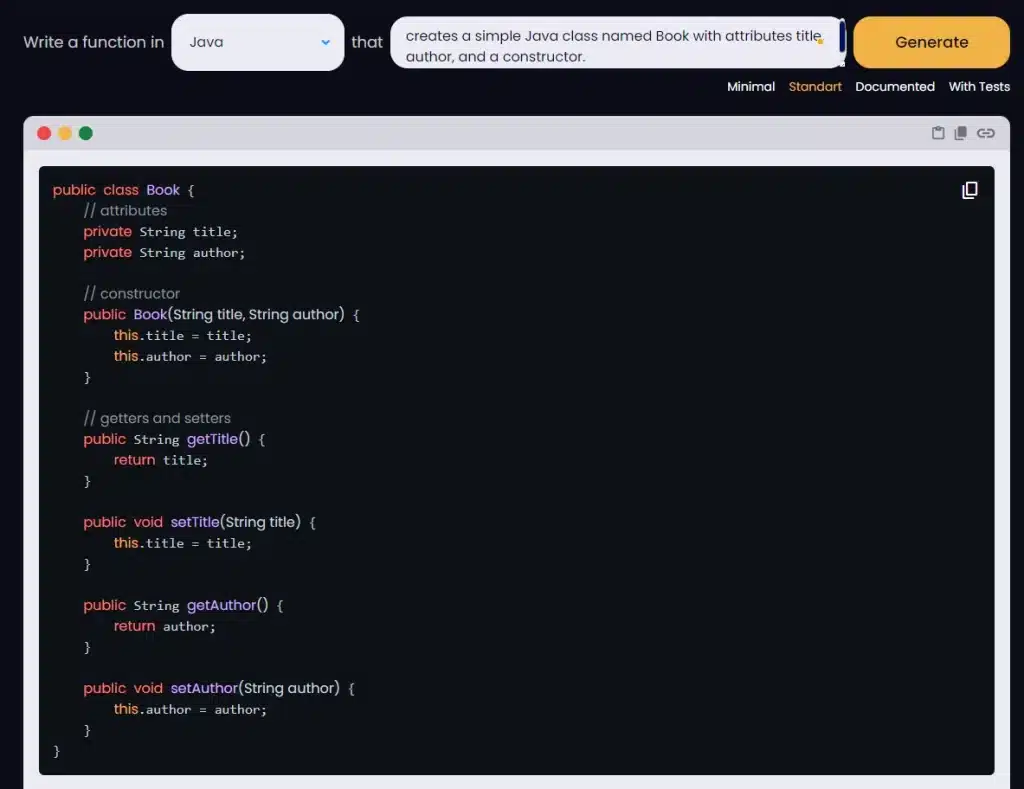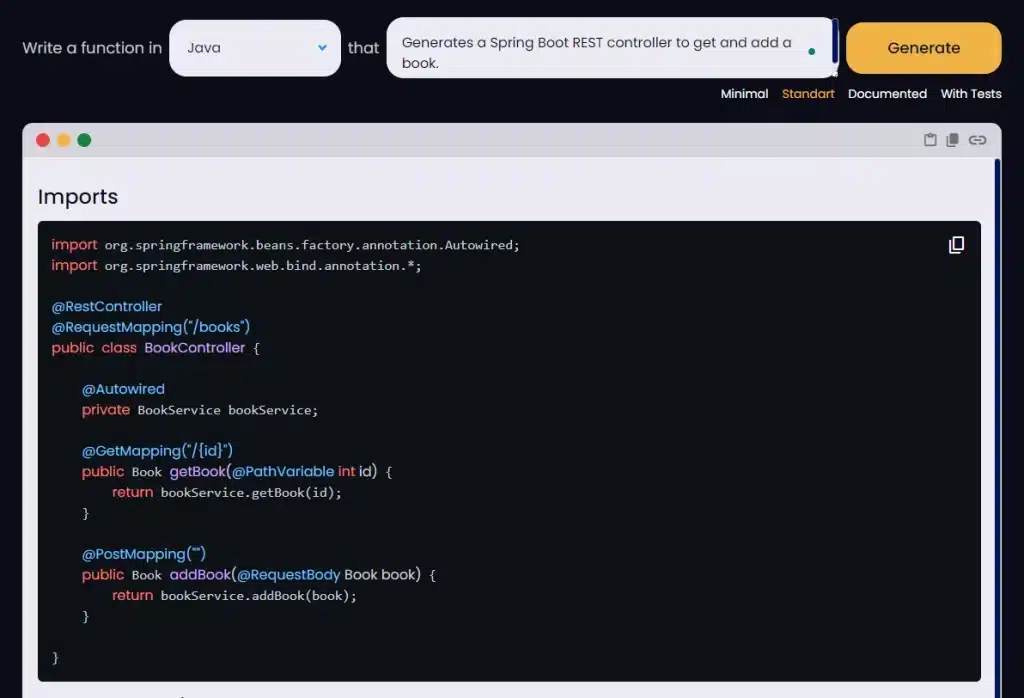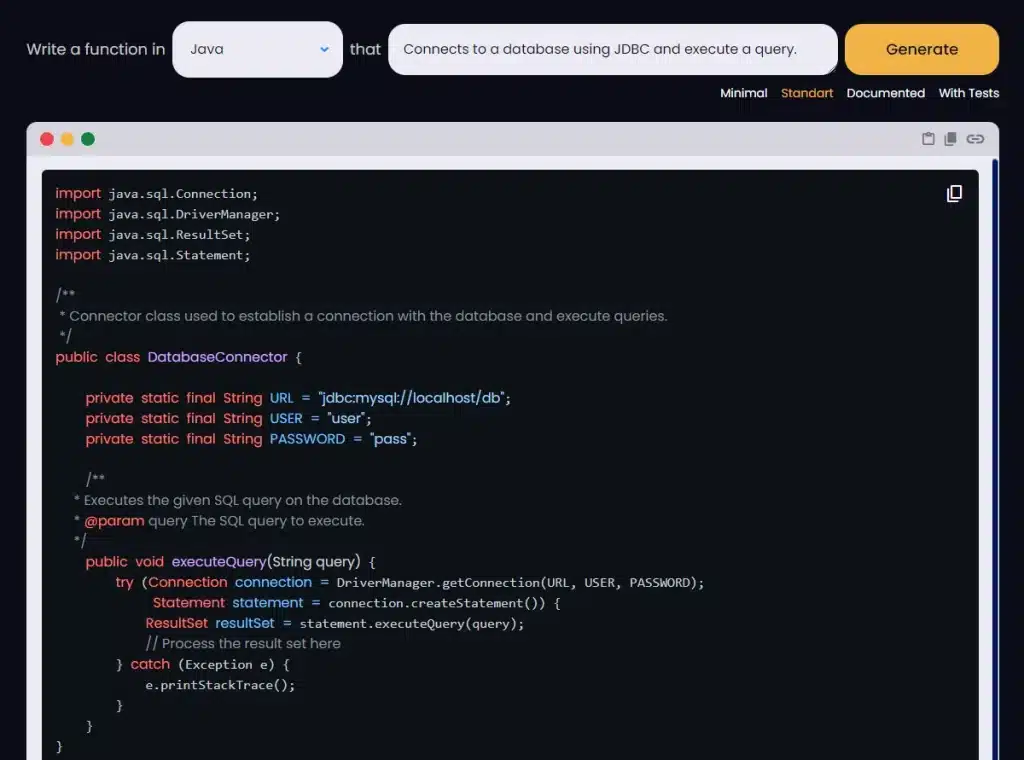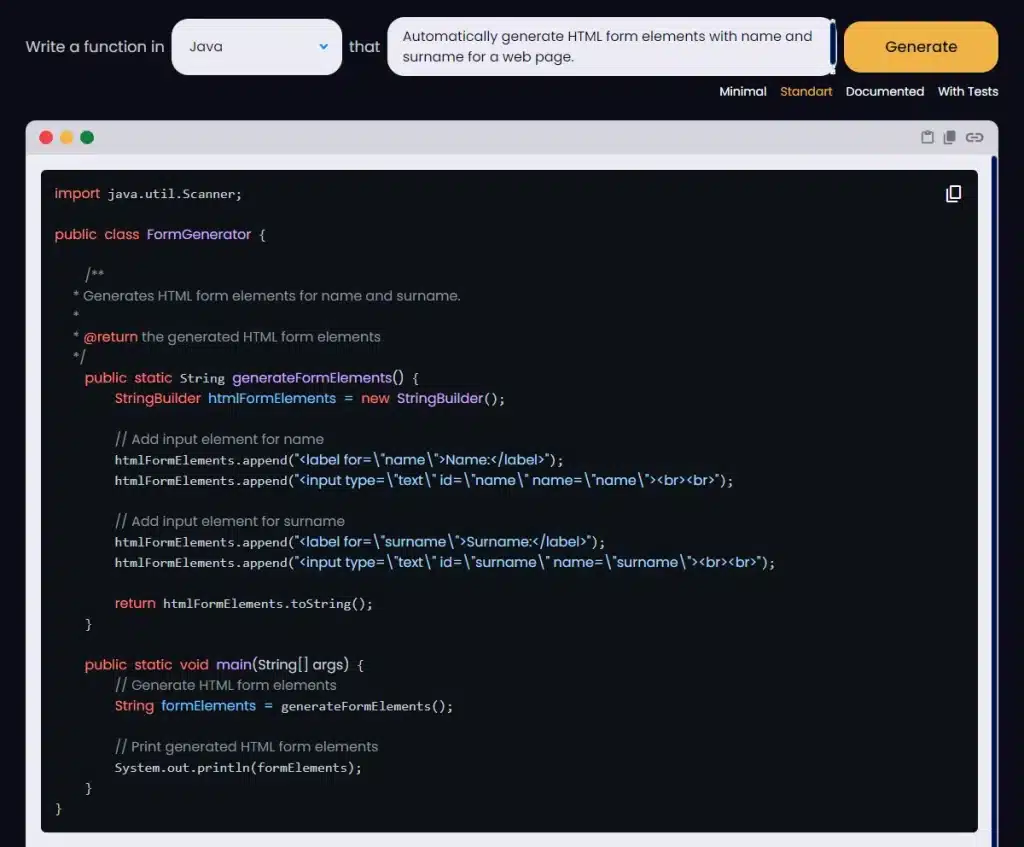Integrating artificial intelligence (AI) and natural language processing (NLP) has revolutionized how you can generate Java code.
But how exactly can we leverage language itself as a tool for writing code?
Very simply; you need to use a Java Code Generator.
A Java Code Generator is a tool that automates the process of generating code in the Java programming language from various inputs, such as natural language, graphical user interface (GUI), database schema, or other programming languages. This helps developers save time and effort while improving quality and avoiding errors in their projects.
This article will explore how to use generated code effectively for different tasks. By utilizing this time-saving technology, you can enhance your productivity and take your software-developing experience to the next level!
Do you want to supercharge your Java coding skills with the power of AI?
Let’s get started!
Overview Of Java Code Generators

Code generators are now vital in modern software dev. They automate routine tasks, boost efficiency, and reduce errors by leveraging intelligent tools to expedite coding processes.
While traditional Java code generators have been valuable tools for software development, AI-driven code generation introduces several advantages and innovations that set it apart.
6 Advantages of Using AI for Java Code Generation
Natural Language Processing: AI generators interpret natural language, making them user-friendly for those with limited coding knowledge.
Contextual Understanding: These tools accurately grasp context and domain-specific terms, resulting in more relevant code.
Rapid Adaptation: They quickly adjust to changing requirements, ideal for fast-paced development environments.
Error Reduction: AI generators help prevent common coding errors, leading to more stable and reliable code.
Versatility: Suitable for a range of tasks, from simple code snippets to complex architectures.
Continuous Learning: These tools learn and improve over time, enhancing their code-generation capabilities.
Now, let’s take a look at some real-world examples of using AI to generate useful Java code.
How to Use A Java Code Generator

We’re going to make use of the EnterpriseDNA Java Code Generator for the following examples.
Example 1: Basic Java Class for a Book
User Input: Generate a simple Java class named Book with attributes title, author, and a constructor.

The following code snippet illustrates the creation of a basic Java class, adhering to Object-Oriented Programming (OOP) principles by defining attributes and methods associated with it.
Example 2: Spring Boot RESTful Endpoint for a Book
User Input: Generate a Spring Boot REST controller to get and add a book.

This code snippet demonstrates how to create a REST controller in Spring Boot with endpoints to retrieve and add a book. It’s a common pattern in web API development.
Example 3: Simple JDBC Connection and Query Execution
User Input: Connect to a database using JDBC and execute a query.

This snippet shows how you can produce code to connect to a MySQL database and execute a simple SQL query, a common task in Java database applications.
Example 4: Generating HTML Form Elements
User Input: Automatically generate HTML form elements for a web page.

In this case, the Java Code Generator can create form elements, including input fields, buttons, and labels. This can simplify the process of designing web forms for user interaction, which is a common task in web development.
Now, let’s take a look at traditional Java code generation.
Traditional Java Code Generators

Traditional generated code solutions significantly enhance development workflows by automating repetitive tasks and efficiently generating source code.
This approach notably saves time and effort by minimizing the need for manually writing boilerplate code.
Examples of Generating Code with Java
MVC Frameworks (e.g., Spring Boot) generate controller classes based on specified routes & request mappings, allowing devs to focus on business logic without writing boilerplate for basic app structures.
ORM Libraries (like Hibernate or JPA) use annotations/XML config to auto-generate SQL queries, mapping classes & db-related artifacts from specified entities, simplifying data persistence tasks.
Testing Libs (e.g., JUnit, TestNG) automatically create test cases based on annotated methods in app classes, enabling quick setup & running of tests as devs work on new features or refactor existing ones, ensuring code maintainability.
AI-powered generators use machine learning algorithms and natural language processing to analyze your code and generate optimized solutions based on your specific requirements.
How does it work:
Parse Input & Annotations/Configurations: Generate a template based on input data and structures.
Apply Templates: Customize generations by applying a predefined template with context awareness.
Generate Code: Produce source files with desired syntax, structure, and functionality for efficient execution within the application or tests.
Moving on, let’s consider some practical applications.
Practical Applications for Code Generation

Creating Basic Structures: They automate the creation of classes, interfaces, and methods. This standardizes coding across projects, saves time, and provides a strong foundation, especially for beginners or those exploring new technologies.
Implementing Design Patterns: These generators facilitate the implementation of patterns like Singleton, Factory, and Observer. By generating code for these patterns, developers can focus more on business logic and less on boilerplate code.
Database Operations: With ORM libraries like Hibernate or JPA, you can efficiently create SQL queries and database mappings, reducing manual coding and the potential for errors in database handling.
Alright, let’s finish by reflecting on some of the main points.
Final Thoughts

AI and NLP technology advancements have revolutionized the world of Java code generation. These resources empower you to swiftly produce high-quality code, saving time and reducing errors in their projects and beyond.
Furthermore, code generators like Enterprise DNA’s Data Mentor assist you in creating code files, samples, and classes with remarkable speed and precision.
As you embrace this innovative technology, you’ll gain the advantage of speed and accuracy while reducing the potential for errors. AI-driven Java Code Generators are here to simplify your journey and enhance your coding experience.
Good luck in generating Java code!
Wanna learn more about using the Chatgpt code interpreter? Checkout the EnterpriseDNA YouTube channel:
Frequently Asked Questions
How Do Java Code Generators Help to write code?
They automate the process of writing Java code, often from high-level inputs like natural language, making it faster and easier to develop software.
Can I Get Sample Code From a Java Code Generator?
Yes, these tools can generate sample code snippets or entire code files based on the provided input, serving as a starting point or reference for your projects.
How Are Generated Classes Integrated into Personal Projects?
Generated classes can be directly integrated into personal projects, helping to establish foundational code structures and speeding up development.
What Is the ‘zg entity’ and ‘zg name’ in Code Generation?
These terms seem specific, possibly related to a particular code generator’s syntax or naming convention. They could be placeholders or identifiers used within the tool.
Can Java Code Generators Interact with Other Programming Languages?
Some advanced generators can interact with languages like JavaScript, PHP, and Python, either by generating code snippets in these languages or by creating interoperable modules.
How Do These Tools Integrate with IDEs like Eclipse?
Many Java code-generating resources have plugins or extensions for popular IDEs like Eclipse, simplifying the code generation process within the development environment.
Are There Documentations Available for These Generators?
Most reputable code generators provide comprehensive documentation to help developers understand and effectively use the tool.
How Accurate Is the Generated Code in Terms of Logic and Functionality?
The code’s accuracy largely depends on the input and the generator’s capabilities, but it usually requires some review and adjustment for complex logic and functionality.
How can I access the enterprise DNA code generator?
You can access the tool at EnterpriseDNA Data Mentor.












